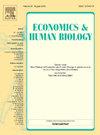Daylight duration and time allocation of children and adolescents
IF 1.8
3区 医学
Q2 ECONOMICS
引用次数: 0
Abstract
This study explores the allocation of time, particularly to sleep, among children and adolescents in response to daily daylight variation. Utilising a dataset of over 50,000 time-use diaries from two Australian cohorts spanning 16 years and employing an individual fixed effects estimator, we uncover a substantial causal impact of daily daylight duration on sleep patterns. Our findings reveal that days with longer daylight hours are associated with a decrease in total sleep duration, primarily driven by a later sleep onset time. Additionally, longer daylight hours correspond to reduced time spent on personal care and media activities, with increased dedication to school and physical activities. Furthermore, we identify socio-demographic factors moderating these effects, such as older age and weekend days exerting a stronger influence on sleep duration, while females and children of unemployed mothers exhibit a subtle impact. These insights contribute to our understanding of how environmental factors shape daily routines and offer implications for designing schedules that promote positive developmental outcomes in young individuals.
儿童和青少年的日照时间和时间分配。
本研究探讨了儿童和青少年的时间分配,尤其是睡眠时间的分配与每日日照变化的关系。我们利用澳大利亚两个队列中超过 50,000 份时间使用日记(时间跨度长达 16 年)的数据集,并采用个体固定效应估计法,发现了日照时间对睡眠模式的重大因果影响。我们的研究结果表明,日照时间越长,总睡眠时间越短,主要原因是睡眠开始时间越晚。此外,日照时间越长,用于个人护理和媒体活动的时间就越少,而用于学校和体育活动的时间就越多。此外,我们还发现了调节这些影响的社会人口因素,如年龄较大和周末对睡眠时间的影响更大,而女性和失业母亲的子女则表现出微妙的影响。这些见解有助于我们了解环境因素是如何影响日常作息的,并为设计能促进青少年积极发展的作息时间提供了启示。
本文章由计算机程序翻译,如有差异,请以英文原文为准。
求助全文
约1分钟内获得全文
求助全文
来源期刊

Economics & Human Biology
医学-公共卫生、环境卫生与职业卫生
CiteScore
4.50
自引率
12.00%
发文量
85
审稿时长
61 days
期刊介绍:
Economics and Human Biology is devoted to the exploration of the effect of socio-economic processes on human beings as biological organisms. Research covered in this (quarterly) interdisciplinary journal is not bound by temporal or geographic limitations.
 求助内容:
求助内容: 应助结果提醒方式:
应助结果提醒方式:


